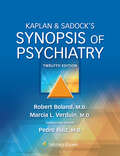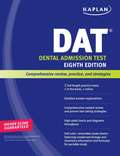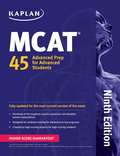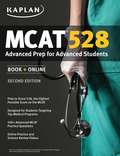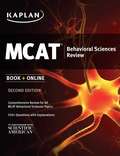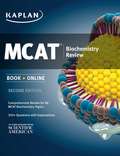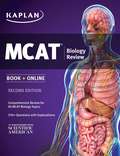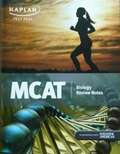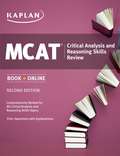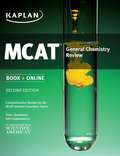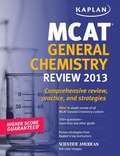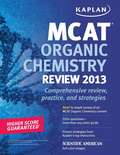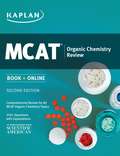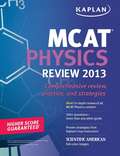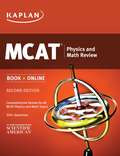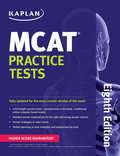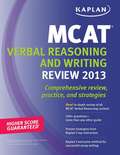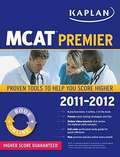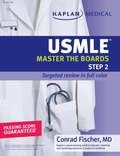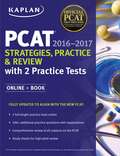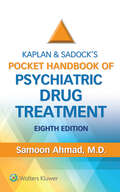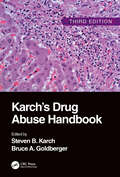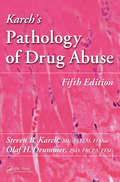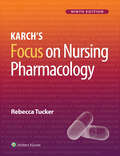- Table View
- List View
Kaplan & Sadock’s Synopsis of Psychiatry
by Pedro Ruiz Robert Boland Marcia VerdiunAccurate, reliable, objective, and comprehensive, Kaplan & Sadock’s Synopsis of Psychiatry has long been the leading clinical psychiatric resource for clinicians, residents, students, and other health care professionals both in the US and worldwide. Now led by a new editorial team of Drs. Robert Boland and Marcia L. Verduin, it continues to offer a trusted overview of the entire field of psychiatry while bringing you up to date with current information on key topics and developments in this complex specialty. The twelfth edition has been completely reorganized to make it more useful and easier to navigate in today’s busy clinical settings.
Kaplan DAT (Dental Admissions Test) (8th Edition)
by KaplanFrom the creators of the #1 DAT course, this #1 best-selling guide provides you with the targeted training you need to get the most out of your preparation and maximize your Dental Admissions Test score. This bestselling guide provides the targeted training and preparation students need to maximize their Dental Admissions Test score. Kaplan DAT features vivid color instructional charts and diagrams to make learning more memorable, two full-length practice tests with detailed answer explanations, intensive science and quantitative review, Reading Comprehension practice test, effective strategies to maximize your score, and realistic, exclusive exercises created especially for the Perceptual Ability Test. Additional features include: * An all new PAT section including the most up-to-date questions * Full-color illustrations and a 16-page pullout study sheet section * Free access to an additional full-length practice test and extra science mini-quizzes online *A full refund from Kaplan to customers who do not increase their test scores after using this book Kaplan Test Prep and Admissions has been preparing students for health sciences careers since 1963, longer than any other test prep company. Kaplan offers a wide variety of DAT preparation including online programs, books and software, classroom coaching, personal tutoring, and subject specific preparation. For information about live events, courses, and all available materials, visit kaptest. com/dat.
Kaplan MCAT 45: Advanced Prep For Advanced Students
by KaplanStudents need to have the most up to date materials and practice tests for their prep. Make sure that you're prepping with materials that reflect the changes to the MCAT that go live in January 2013! Intensive practice for each test section of the MCAT for the high-achieving student aiming for a score in the top percentile. Fewer than 40% of students who apply to medical school get accepted, and top medical schools routinely accept less than 10%. A student's MCAT score is one of the most important factors considered by the medical school admissions committee. Competitive students seeking admission to top medical schools need high MCAT scores, and therefore the most intensive MCAT practice available. Kaplan MCAT 45 features the toughest practice, strongest strategies, and the hardest questions on the MCAT. Kaplan MCAT 45 features: *The latest test information and strategies for the new MCAT. *The hardest practice sets for each MCAT subject. *Detailed answer explanations. * Focused guidelines for tackling each question type. * Time-saving study outlines for each subject . *Proven strategies for getting a high score.
Kaplan MCAT 528
by KaplanMore people get into medical school with a Kaplan MCAT course than all major courses combined. Now the same results are available with Kaplan's MCAT 528. This ebook features thorough subject review, more questions than any competitor, and the highest-yield questions available. The commentary and instruction come directly from Kaplan MCAT experts and include targeted focus on the most-tested concepts plus more questions than any other guide.Kaplan's MCAT 528 offers: UNPARALLELED MCAT KNOWLEDGE: The Kaplan MCAT team has spent years studying every document related to the MCAT available. In conjunction with our expert psychometricians, the Kaplan team is able to ensure the accuracy and realism of our practice materials. THOROUGH SUBJECT REVIEW: Written by top-rated, award-winning Kaplan instructors. All material has been vetted by editors with advanced science degrees and by a medical doctor. EXPANDED CONTENT THROUGHOUT: While the MCAT has continued to develop, this ebook has been updated continuously to match the AAMC's guidelines precisely--no more worrying if your prep is comprehensive! MORE PRACTICE THAN THE COMPETITION: With questions throughout the ebook and access to one practice test, Kaplan's MCAT 528 has more practice than any other advanced MCAT book on the market. ONLINE COMPANION: Access to online resources to augment content studying, including one practice test. The MCAT is a computer-based test, so practicing in the same format as Test Day is key. KAPLAN'S MCAT REPUTATION: Kaplan gets more people into medical school than all other courses, combined. UTILITY: Can be used alone or with other companion books in Kaplan's MCAT Review series.
Kaplan MCAT Behavioral Sciences Review
by KaplanMore people get into medical school with a Kaplan MCAT course than all major courses combined. Now the same results are available with Kaplan's MCAT Behavioral Sciences Review. This book features thorough subject review, more questions than any competitor, and the highest-yield questions available. The commentary and instruction come directly from Kaplan MCAT experts and include targeted focus on the most-tested concepts plus more questions than any other guide. Kaplan's MCAT Behavioral Sciences Review offers: UNPARALLELED MCAT KNOWLEDGE: The Kaplan MCAT team has spent years studying every document related to the MCAT available. In conjunction with our expert psychometricians, the Kaplan team is able to ensure the accuracy and realism of our practice materials. THOROUGH SUBJECT REVIEW: Written by top-rated, award-winning Kaplan instructors. All material has been vetted by editors with advanced science degrees and by a medical doctor. EXPANDED CONTENT THROUGHOUT: While the MCAT has continued to develop, this book has been updated continuously to match the AAMC's guidelines precisely--no more worrying if your prep is comprehensive! MORE PRACTICE THAN THE COMPETITION: With questions throughout the book and access to one practice test, Kaplan's MCAT Behavioral Sciences Review has more practice than any other MCAT Behavioral Sciences book on the market. ONLINE COMPANION: Access to online resources to augment content studying, including one practice test. The MCAT is a computer-based test, so practicing in the same format as Test Day is key. TOP-QUALITY IMAGES: With full-color, 3-D illustrations, charts, graphs and diagrams from the pages of Scientific American, Kaplan's MCAT Behavioral Sciences Review turns even the most intangible, complex science into easy-to-visualize concepts. KAPLAN'S MCAT REPUTATION: Kaplan gets more people into medical school than all other courses, combined. UTILITY: Can be used alone or with other companion books in Kaplan's MCAT Review series.
Kaplan MCAT Biochemistry Review
by KaplanMore people get into medical school with a Kaplan MCAT course than all major courses combined. Now the same results are available with Kaplan's MCAT Biochemistry Review. This book features thorough subject review, more questions than any competitor, and the highest-yield questions available. The commentary and instruction come directly from Kaplan MCAT experts and include targeted focus on the most-tested concepts plus more questions than any other guide. Kaplan's MCAT Biochemistry Review offers: UNPARALLELED MCAT KNOWLEDGE: The Kaplan MCAT team has spent years studying every document related to the MCAT available. In conjunction with our expert psychometricians, the Kaplan team is able to ensure the accuracy and realism of our practice materials. THOROUGH SUBJECT REVIEW: Written by top-rated, award-winning Kaplan instructors. All material has been vetted by editors with advanced science degrees and by a medical doctor. EXPANDED CONTENT THROUGHOUT: While the MCAT has continued to develop, this book has been updated continuously to match the AAMC's guidelines precisely--no more worrying if your prep is comprehensive! MORE PRACTICE THAN THE COMPETITION: With questions throughout the book and access to one practice test, Kaplan's MCAT Biochemistry Review has more practice than any other MCAT Biochemistry book on the market. ONLINE COMPANION: Access to online resources to augment content studying, including one practice test. The MCAT is a computer-based test, so practicing in the same format as Test Day is key. TOP-QUALITY IMAGES: With full-color, 3-D illustrations, charts, graphs and diagrams from the pages of Scientific American, Kaplan's MCAT Biochemistry Review turns even the most intangible, complex science into easy-to-visualize concepts. KAPLAN'S MCAT REPUTATION: Kaplan gets more people into medical school than all other courses, combined. UTILITY: Can be used alone or with other companion books in Kaplan's MCAT Review series.
Kaplan MCAT Biology Review
by KaplanMore people get into medical school with a Kaplan MCAT course than all major courses combined. Now the same results are available with Kaplan's MCAT Biology Review. This book features thorough subject review, more questions than any competitor, and the highest-yield questions available. The commentary and instruction come directly from Kaplan MCAT experts and include targeted focus on the most-tested concepts plus more questions than any other guide. Kaplan's MCAT Biology Review offers: UNPARALLELED MCAT KNOWLEDGE: The Kaplan MCAT team has spent years studying every document related to the MCAT available. In conjunction with our expert psychometricians, the Kaplan team is able to ensure the accuracy and realism of our practice materials. THOROUGH SUBJECT REVIEW: Written by top-rated, award-winning Kaplan instructors. All material has been vetted by editors with advanced science degrees and by a medical doctor. EXPANDED CONTENT THROUGHOUT: While the MCAT has continued to develop, this book has been updated continuously to match the AAMC's guidelines precisely--no more worrying if your prep is comprehensive! MORE PRACTICE THAN THE COMPETITION: With questions throughout the book and access to one practice test, Kaplan's MCAT Biology Review has more practice than any other MCAT Biology book on the market. ONLINE COMPANION: Access to online resources to augment content studying, including one practice test. The MCAT is a computer-based test, so practicing in the same format as Test Day is key. TOP-QUALITY IMAGES: With full-color, 3-D illustrations, charts, graphs and diagrams from the pages of Scientific American, Kaplan's MCAT Biology Review turns even the most intangible, complex science into easy-to-visualize concepts. KAPLAN'S MCAT REPUTATION: Kaplan gets more people into medical school than all other courses, combined. UTILITY: Can be used alone or with other companion books in Kaplan's MCAT Review series.
Kaplan MCAT Biology Review Notes
by The Staff of KaplanKaplan's successful classroom MCAT test prep experience is now replicated in this new five-book set. Each book contains commentary and advice from top Kaplan instructors and provides students with tips, strategies, and test-taking practice, as well as hundreds of practice questions, access to 3 online MCAT exams, 15 Fast Fact videos with expert advice from a top-ranked MCAT teacher, and full-color illustrations. A full-color guide featuring all-new, complete test targeted biology review for the MCAT, Kaplan MCAT Biology includes over 500 practice questions (hundreds more than the competition) and three full-length biology practice sections. Expert commentary and instruction from a top Kaplan teacher includes tips, tricks, and test expertise. Vibrant illustrations, charts, and graphs from the pages of Scientific American, make this guide a compelling source of MCAT prep.
Kaplan MCAT Critical Analysis and Reasoning Skills Review
by KaplanMore people get into medical school with a Kaplan MCAT course than all major courses combined. Now the same results are available with Kaplan's MCAT Critical Analysis and Reasoning Skills Review. This book features thorough subject review, more questions than any competitor, and the highest-yield questions available. The commentary and instruction come directly from Kaplan MCAT experts and include targeted focus on the most-tested concepts plus more questions than any other guide. Kaplan's MCAT Critical Analysis and Reasoning Skills Review offers: UNPARALLELED MCAT KNOWLEDGE: The Kaplan MCAT team has spent years studying every document related to the MCAT available. In conjunction with our expert psychometricians, the Kaplan team is able to ensure the accuracy and realism of our practice materials. THOROUGH SUBJECT REVIEW: Written by top-rated, award-winning Kaplan instructors. All material has been vetted by editors with advanced English degrees and by a medical doctor. EXPANDED CONTENT THROUGHOUT: The AAMC tests not only content knowledge, critical thinking, and critical analysis and reasoning skills, but also two other important scientific skills: research design and the execution of research, and data-based and statistical analysis. This book has expanded material to master these skills for Test Day. MORE PRACTICE THAN THE COMPETITION: With questions throughout the book and access to one practice test, Kaplan's MCAT CARS Review has more practice than any other MCAT CARS book on the market. ONLINE COMPANION: Access to online resources to augment content studying, including one practice test. The MCAT is a computer-based test, so practicing in the same format as Test Day is key. KAPLAN'S MCAT REPUTATION: Kaplan gets more people into medical school than all other courses, combined. UTILITY: Can be used alone or with other companion books in Kaplan's MCAT Review series.
Kaplan MCAT General Chemistry Review
by KaplanMore people get into medical school with a Kaplan MCAT course than all major courses combined. Now the same results are available with Kaplan's MCAT General Chemistry Review. This book features thorough subject review, more questions than any competitor, and the highest-yield questions available. The commentary and instruction come directly from Kaplan MCAT experts and include targeted focus on the most-tested concepts plus more questions than any other guide. Kaplan's MCAT General Chemistry Review offers: UNPARALLELED MCAT KNOWLEDGE: The Kaplan MCAT team has spent years studying every document related to the MCAT available. In conjunction with our expert psychometricians, the Kaplan team is able to ensure the accuracy and realism of our practice materials. THOROUGH SUBJECT REVIEW: Written by top-rated, award-winning Kaplan instructors. All material has been vetted by editors with advanced science degrees and by a medical doctor. EXPANDED CONTENT THROUGHOUT: While the MCAT has continued to develop, this book has been updated continuously to match the AAMC's guidelines precisely--no more worrying if your prep is comprehensive! MORE PRACTICE THAN THE COMPETITION: With questions throughout the book and access to one practice test, Kaplan's MCAT General Chemistry Review has more practice than any other MCAT General Chemistry book on the market. ONLINE COMPANION: Access to online resources to augment content studying, including one practice test. The MCAT is a computer-based test, so practicing in the same format as Test Day is key. TOP-QUALITY IMAGES: With full-color, 3-D illustrations, charts, graphs and diagrams from the pages of Scientific American, Kaplan's MCAT General Chemistry Review turns even the most intangible, complex science into easy-to-visualize concepts. KAPLAN'S MCAT REPUTATION: Kaplan gets more people into medical school than all other courses, combined. UTILITY: Can be used alone or with other companion books in Kaplan's MCAT Review series.
Kaplan MCAT General Chemistry Review Notes
by KaplanKaplan's successful classroom MCAT test prep experience is now replicated in this new five-book set. Each book contains commentary and advice from top Kaplan instructors and provides students with tips, strategies, and test-taking practice, as well as hundreds of practice questions, an online MCAT, and full-color illustrations. This full-color guide features all-new, complete test-targeted general chemistry review for the MCAT, as well as expert commentary and instruction from a top Kaplan teacher. Kaplan MCAT General Chemistry provides more practice questions than any other guide (over 400 questions) along with three full-length chemistry practice sections. Also included are vibrant illustrations, charts, graphs, and diagrams from the pages of Scientific American.
Kaplan MCAT Organic Chemistry Review
by KaplanKaplan's successful classroom MCAT test prep experience is now replicated in this new five-book set. Each book contains commentary and advice from top Kaplan instructors and provides students with tips, strategies, and test-taking practice, as well as hundreds of practice questions, an online MCAT, and full-color illustrations. Kaplan MCAT Organic Chemistry features all-new, complete test-targeted organic chemistry review for the MCAT exam, along with expert commentary and instruction from a top Kaplan teacher. It features dozens more practice questions than the competition (over 300 in all) along with three full-length organic chemistry practice sections, and vibrant illustrations and art straight from the pages of Scientific American.
Kaplan MCAT Organic Chemistry Review
by KaplanMore people get into medical school with a Kaplan MCAT course than all major courses combined. Now the same results are available with Kaplan's MCAT Organic Chemistry Review. This book features thorough subject review, more questions than any competitor, and the highest-yield questions available. The commentary and instruction come directly from Kaplan MCAT experts and include targeted focus on the most-tested concepts plus more questions than any other guide. Kaplan's MCAT Organic Chemistry Review offers: UNPARALLELED MCAT KNOWLEDGE: The Kaplan MCAT team has spent years studying every document related to the MCAT available. In conjunction with our expert psychometricians, the Kaplan team is able to ensure the accuracy and realism of our practice materials. THOROUGH SUBJECT REVIEW: Written by top-rated, award-winning Kaplan instructors. All material has been vetted by editors with advanced science degrees and by a medical doctor. EXPANDED CONTENT THROUGHOUT: While the MCAT has continued to develop, this book has been updated continuously to match the AAMC's guidelines precisely--no more worrying if your prep is comprehensive! MORE PRACTICE THAN THE COMPETITION: With questions throughout the book and access to one practice test, Kaplan's MCAT Organic Chemistry Review has more practice than any other MCAT Organic Chemistry book on the market. ONLINE COMPANION: Access to online resources to augment content studying, including one practice test. The MCAT is a computer-based test, so practicing in the same format as Test Day is key. TOP-QUALITY IMAGES: With full-color, 3-D illustrations, charts, graphs and diagrams from the pages of Scientific American, Kaplan's MCAT Organic Chemistry Review turns even the most intangible, complex science into easy-to-visualize concepts. KAPLAN'S MCAT REPUTATION: Kaplan gets more people into medical school than all other courses, combined. UTILITY: Can be used alone or with other companion books in Kaplan's MCAT Review series.
Kaplan MCAT Physics Review Notes
by KaplanKaplan's successful classroom MCAT test prep experience is now replicated in this new five-book set. Each book contains commentary and advice from top Kaplan instructors and provides students with tips, strategies, and test-taking practice, as well as hundreds of practice questions, access to 3 online MCAT exams, 15 Fast Fact videos with expert advice from a top-ranked MCAT teacher, and full-color illustrations. A full-color guide featuring all-new, complete test targeted physics review for the MCAT, "Kaplan MCAT Physics "includes over 500 practice questions (hundreds more than the competition) and three full-length practice sections. Expert commentary and instruction from a top Kaplan teacher includes tips, tricks, and test expertise. Vibrant illustrations, charts, and graphs from the pages of "Scientific American," make this guide a compelling source of MCAT prep.
Kaplan MCAT Physics and Math Review
by KaplanMore people get into medical school with a Kaplan MCAT course than all major courses combined. Now the same results are available with Kaplan's MCAT Physics and Math Review. This book features thorough subject review, more questions than any competitor, and the highest-yield questions available. The commentary and instruction come directly from Kaplan MCAT experts and include targeted focus on the most-tested concepts plus more questions than any other guide. Kaplan's MCAT Physics and Math Review offers: UNPARALLELED MCAT KNOWLEDGE: The Kaplan MCAT team has spent years studying every document related to the MCAT available. In conjunction with our expert psychometricians, the Kaplan team is able to ensure the accuracy and realism of our practice materials. THOROUGH SUBJECT REVIEW: Written by top-rated, award-winning Kaplan instructors. All material has been vetted by editors with advanced science degrees and by a medical doctor. EXPANDED CONTENT THROUGHOUT: While the MCAT has continued to develop, this book has been updated continuously to match the AAMC's guidelines precisely--no more worrying if your prep is comprehensive! MORE PRACTICE THAN THE COMPETITION: With questions throughout the book and online, Kaplan's MCAT Physics and Math Review has more practice than any other MCAT Physics and Math book on the market. ONLINE COMPANION: Access to online resources to augment content studying, including practice questions and videos. The MCAT is a computer-based test, so practicing in the same format as Test Day is key. TOP-QUALITY IMAGES: With full-color, 3-D illustrations, charts, graphs and diagrams from the pages of Scientific American, Kaplan's MCAT Physics and Math Review turns even the most intangible, complex science into easy-to-visualize concepts. KAPLAN'S MCAT REPUTATION: Kaplan gets more people into medical school than all other courses, combined. UTILITY: Can be used alone or with other companion books in Kaplan's MCAT Review series.
Kaplan MCAT Practice Tests (Eighth Edition)
by Inc. The Staff of KaplanThis book focuses on key subjects -specific MCAT strategies and full-length practice tests along with thorough, detailed explanations.
Kaplan MCAT Quick Sheets
by KaplanIn the "MCAT(R) Workbook," Kaplan's MCAT(R) experts have compiled the most effective practice exercises along with Kaplan's highly effective test-taking strategies. Used by itself or in combination with Kaplan's "MCAT(R) Comprehensive Review," this intensive workbook is specifically designed to help you build the critical skills you need to score higher on the new MCAT(R).
Kaplan MCAT Verbal Reasoning Review: Comprehensive Review, Practice, and Strategies
by KaplanFeatures all-new, complete test-targeted verbal reasoning strategy and essay writing review. It includes more practice questions than the competition- more than 200. Kaplan's unique five-step method for essay writing teaches students step by step how to write an effective essay in a short amount of time. Expert Kaplan teacher tips, a grammar review, and time-saving reading strategies are also included, along with six full-length practice sections and sample high level essays.
Kaplan Mcat Premier 2011-2012
by KaplanEvery year medical school admissions get more competitive, making a high score on the MCAT an essential part of a candidate's application. At a time when fewer than 40 percent of students who apply get accepted to any school, while top institutions routinely accept fewer than 10 percent of all applicants, prospective students must stand out among the crowd. It's a fact that Kaplan gets more people into medical school than all other courses combined. Kaplan MCAT Premier 2011-2012 is created by the same team of MDs, PhDs, scientists, and test prep experts that brought students Kaplan's highly-regarded MCAT course. Kaplan MCAT Premier 2011-2012 features: 4 full-length MCAT practice tests Online access to video tutorials Kaplan-exclusive strategies Full-color illustrations, charts, and diagrams for the most-tested MCAT concepts, facts, and formulas Portable, full-color study guide Online syllabus that creates personalized study plans Online workshops From the creators of the #1 MCAT course, Kaplan MCAT Premier 2011-2012 is a pre-medical student's interactive guide to success on test day.
Kaplan Medical USMLE: Master The Boards (Step 2 Ck)
by Conrad FischerNew from best-selling USMLE author and award-winning medical educator, Dr. Conrad Fischer, comes the only full-color USMLE guide on the market to present the clinical conditions and patient care scenarios encountered on the Step 2 Clinical Knowledge exam. Students take the USMLE Step 2 CK Exam during their final year of medical school. The Step 2 Clinical Knowledge is a multiple choice exam designed to determine whether the examinee possesses the medical knowledge and understanding of clinical science considered essential for the provision of patient care under supervision.
Kaplan PCAT 2016-2017 Strategies, Practice, and Review with 2 Practice Tests: Online + Book
by KaplanKaplan Test Prep is the only Official Provider of PCAT Prep, as endorsed by the American Association of Colleges of Pharmacy (AACP).Are you ready for the new PCAT? Be prepared with Kaplan's guide to the new test. Fully updated for the 2016-2017 changes to the PCAT, Kaplan's PCAT 2016-2017 Strategies, Practice, and Review includes all the content and strategies you need to get the PCAT results you want.With this edition you get:* 2 full-length, realistic practice tests online that provide you with scores and percentiles* A guide to the current PCAT Blueprint to show you exactly what to expect on Test Day* Comprehensive review of all the content covered on the PCAT: Writing, Biology, General Chemistry, Organic Chemistry, Biochemistry, Critical Reading, and Quantitative Reasoning* Additional practice questions for every subject, all with detailed answers and explanations* Kaplan's proven strategies for Test Day successWith Kaplan's PCAT 2016-2017 Strategies, Practice, and Review, you will earn a higher score on the PCAT--guaranteed.Kaplan also offers complete PCAT preparation options, including self-paced programs, live classes, and private tutoring.
Kaplan and Sadock's Pocket Handbook of Psychiatric Drug Treatment
by Samoon AhmadNow in vibrant full color, Kaplan and Sadock’s Pocket Handbook of Psychiatric Drug Treatment, 8th Edition, remains your reference of choice for easy-to-find information on the full spectrum of psychiatric drug therapies. Written by Dr. Samoon Ahmad, this trusted resource provides a wealth of data for each drug, presenting information in a clear, concise manner for quick, efficient retrieval. This edition brings you fully up to date in the field, with new information on cannabis, psychedelics, psychotropic medicines and medical comorbidities, genetics and pharmacogenomics testing, and more.
Karch's Drug Abuse Handbook
by Steven B. Karch and Bruce A. GoldbergerKarch’s Drug Abuse Handbook, Third Edition remains the quintessential compendium addressing the pharmacological, medical, and legal aspects of drugs and informing the forensic community of the latest scientific advances and emergent practices. For this edition, Dr. Karch has brought on clinical and forensic toxicology expert Dr. Bruce Goldberger, editor-in-chief of the Journal of Analytical Toxicology and president of the American Board of Forensic Toxicology, to serve as co-editor. In addition, world-renowned scientists and medical professionals have contributed their work and expertise in tackling the latest developments in drug testing, drug-related medical emergencies, and the drug toxicology. Topics addressed include genetic testing in drug death investigation, pathology, toxicogenetics, alcohol, post-mortem toxicology, new psychoactive substances, the latest legal issues and challenges as well as drugs and drug testing in sports, and the ethical, legal, and practical issues involved. Vivid pictures and diagrams throughout illustrate the pathological effects of drugs and the chemical make-up and breakdown of abused drugs. With unparalleled detail, the latest research and the highest level of authoritative medical scientific information, The Drug Abuse Handbook, Third Edition remains the definitive resource for drug related issues.
Karch's Pathology of Drug Abuse
by Steven B. Karch MD Olaf DrummerWritten in the same accessible manner as previous editions, the fifth edition of Karch‘s Pathology of Drug Abuse is an essential guide to the pathology, toxicology, and pharmacology of commonly abused drugs. The book focuses on the investigation of drug-related deaths, practical approaches to the detection of drug abuse, and discussions of medical
Karch’s Focus on Nursing Pharmacology
by Rebecca G. TuckerKarch’s Focus on Nursing Pharmacology, 9th Edition, makes challenging concepts approachable to help students establish a foundation for effective drug therapy throughout their nursing careers. Concise, clearly written, and streamlined for today’s busy students, this trusted text builds on students’ knowledge of physiology, chemistry, and nursing fundamentals to help them conceptualize need-to-know information. The thoroughly updated 9th Edition emphasizes content essential to students’ success on the NCLEX® and cultivates students’ clinical judgment to ensure a smooth, confident transition to nursing practice.
